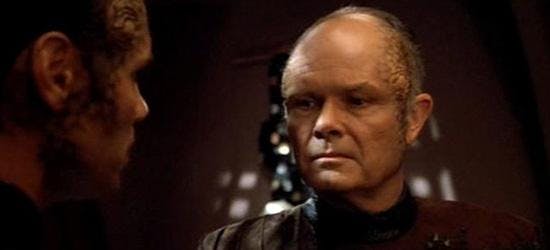
When we consider time within the context of Star Trek, we most often think of time travel. These stories are great fun, but they’re often more about the adventure than the nature of our existence. Yet it is time that shapes everything we do. When looking at how the messages we take away from Star Trek change as we go through life, there’s another aspect of time that takes center stage: perception.
When I was a kid, I was fascinated by the concept of time. At that age, anything is possible. Is time really the relentless march of seconds, minutes, and hours? Or is this something we create in our own minds. Life locks us into a routine and the perception that there’s a one-way arrow.
I always imagined that this was not really the case. So when Deep Space Nine premiered with a philosophical challenge to this common assumption — one that tied directly into our most personal emotions — I was hooked. The discussion between the Prophets and Sisko is fascinating.
“What comes before now is no different than what is now … or what is to come. It is one’s existence,” they explain through the image of Jake.
As beings who live outside of linear time, they cannot understand our perception of events; but Sisko attempts to explain: “My species lives in one point in time. And once we move beyond that point, it becomes the past. The future, all that is still to come, does not exist yet for us.”
All at once, this story said that linear time is an illusion, but for us there is a one-way arrow.
Star Trek addresses this reality in more concrete terms in Generations. While the actions of Dr. Tolian Soran are abhorrent, what drives him is something that connects with me more and more as the years go by.
“They say ‘time is the fire in which we burn,’” Soran tells Picard. “Right now, Captain, my time is running out. We leave so many things unfinished in our lives. I know you understand.” Yes, Picard understood … and so do I. As the years go by, I feel the stalking of the predator. Perhaps no line in Star Trek hits so close to home.
Finding a way to balance this negative with a positive is a challenge we all face. At the end of the film, Picard presents the flip side of Soran’s argument when he tells Riker, “I rather believe that time is a companion who goes with us on the journey.”
The line that Soran quotes to Picard in Ten Forward comes from a poem by Delmore Schwartz titled Calmly We Walk Through This April’s Day. The line just before the one we all know from the film states that “Time is the school in which we learn,” adding strength to Picard’s position. It’s something I try to remember whenever the ticking of the clock becomes too loud in my head.
No matter how well we come to terms with the passage of time — as we watch our hair turn grey, our kids grow up, and our routine become ever more predictable — we naturally look back and imagine how things might have been had we made different decisions. In the real world, this is something that remains firmly in the realm of the hypothetical. But in Star Trek, changing the past is possible — and in “Year of Hell” this is exactly what Annorax does.

The incursions carried out by the temporal scientist were originally meant to restore the Krenim Empire to its previous glory, but take on a personal tone when a change he makes results in the death of his wife. We all have things about the past that we would like to change or prevent from happening. But, as “Year of Hell” shows, doing so can have unexpected repercussions.
I’ve led a very interesting life that has taken me around the world and given me opportunities I never imagined would be possible. At the same time, there are many struggles that come along with this. I can trace the path that led me to where I am today to six critical moments, the first of which was my choice of university. Had I made a different decision in any of those six moments, my life could be unrecognizable.
Am I entirely happy with how things have turned out? No. Would I go back and change the past if I could? Definitely not. Picard tells Soran that it is our morality that defines us. But it’s also our decisions and the journey. Time is indeed the school in which we learn. There are countless possibilities, but the one that has unfolded for each of us makes us who we are. And if we change any part, we cease to be that person.
Of course, these are just three stories in which Star Trek addresses time in this manner; but they are the three that I return to most. When I watch these particular moments, I can best see my own perception of time shift as I grow older. Picard, Soran, and Annorax all help me make peace with time.
Time is an abstraction. If we get down to the scientific reality of the universe, this is true. But, like it or not, as humans we’re locked into a timeline that marches inexorably forward. It’s easy for the years to wear us down, to drive us to extreme positions like Soran and Annorax, and, simply put, to make us feel old.
But when I look back at where I’ve come from, and ahead to where I’m going, with the help of Star Trek my fight against time somehow subsides. It’s then that I think of one of my favorite moments in all of the franchise. At the end of The Wrath of Khan, as they look upon Genesis from the bridge of the Enterprise, Bones asks “You okay, Jim? How do you feel?” To which Kirk responds, “Young. I feel young.”

